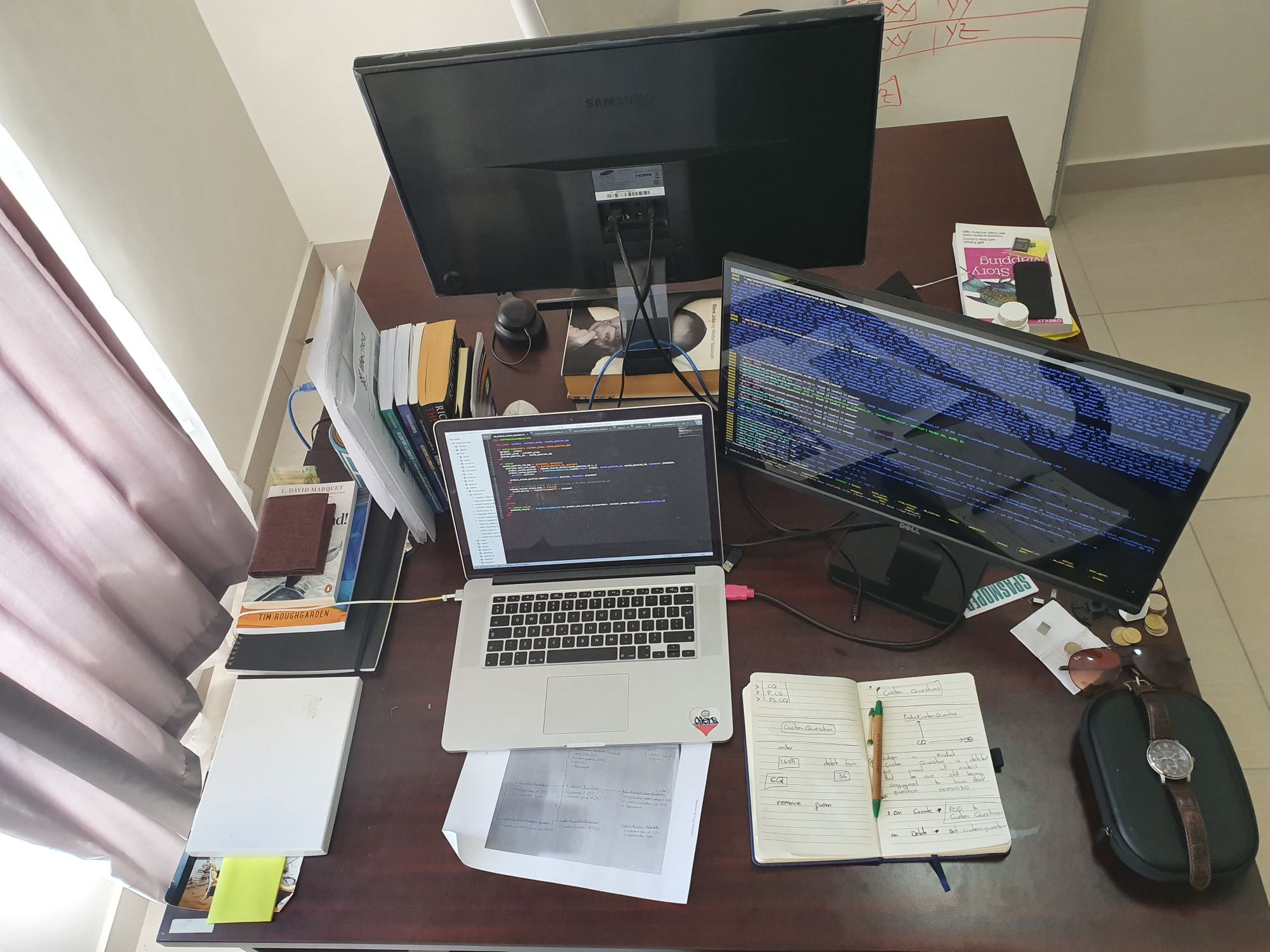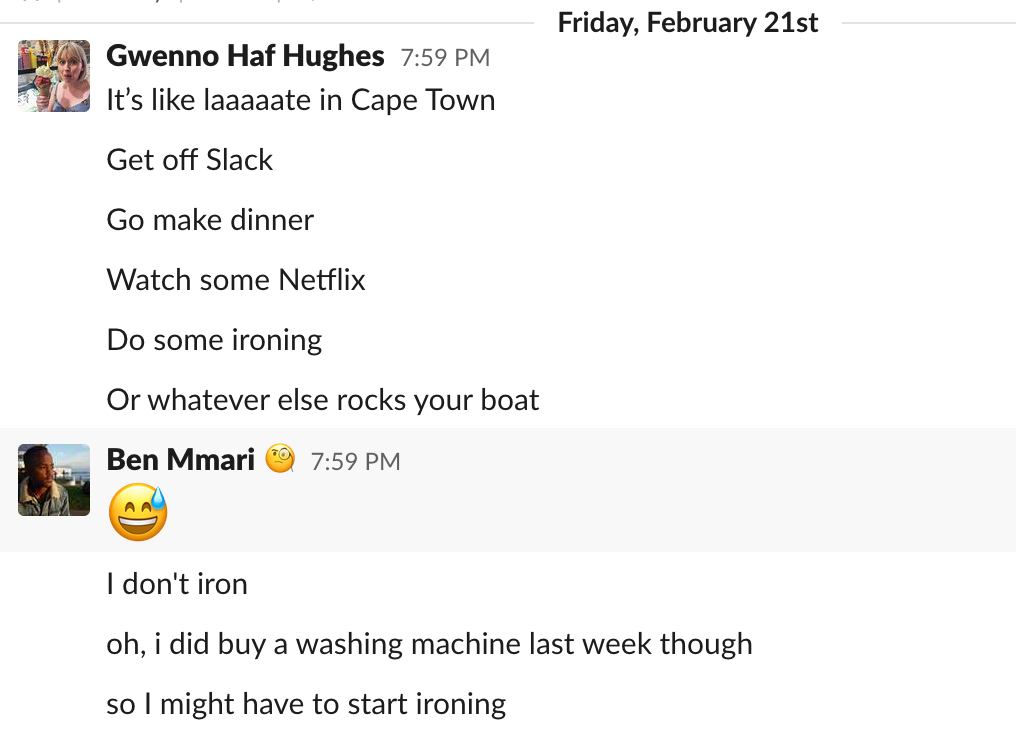There is a lot of hype in the modern-day and age about this idea of 'working remote'. It seems to be the dream of both aspiring and seasoned software developers alike. With the objective being to either land yourself a dream job, freelance, or run your own company which would, in turn, allow you to work remotely throughout the year, as you travel the globe with only your laptop, your mobile phone, one pair of jeans, a headset and a decent internet connection.
In this post, I will evaluate this idea of working remotely based on my time over the past two years as both a remote member of a cross-continental SCRUM team and as someone who often works remotely from home. I will delve into both the pros and the cons of this setup as well as my overall perspectives on this modern-day technological phenomenon.
My Background
I might not be working out of a Starbucks off the coast of Thailand right now, but I would consider myself to be quite well acquainted with this so-called remote-life. As I type this, I am currently seated on a Virgin Atlantic Boeing 787 plane, flying back to Cape Town, South Africa, after spending 10 days in the cold, busy metropolis of London. This is the 6th business trip that I have made to the UK over the past 2 years, which is a whole 6 times more than I had traveled to the UK prior to April 2018, when I first joined Zappi, the company that I currently work for.
The reason I travel up to London so often is because I am a remote software developer on a team that is predominantly based in London. So I make the trip up to see my team every couple of months. Obviously, it's much more economical for me to go to them in London, than it is for all 5 of them to come down to me in Cape Town, despite the fact that my city definitely has the more appealing weather.
When I am not visiting our UK or Boston office then I am working out of Cape Town, either from my home office situated in Parklands North or from Zappi's Cape Town offices on Loop Street in the CBD.
The past two years of working as a remote team member have been a great foray into the remote working experience for me and as my two-year remote anniversary is steadily approaching, I would like to take the time out to reflect on my experiences thus far.
The Pros of Working Remotely
To set the mood, let us start off with some pros:
You Don't Need To Go into The Office
Hi, I am Ben, and I am an introvert (“Hiiiii Ben”), and over the years as I have explored my divine inner introverted nature, I have come to terms with just how much social anxiety I can actually have. In hindsight, I have realized that one of the reasons why I quit my first job and started my own company was simply because I was surrounded by so many people every single day, and there were so many days around that period of my life when I literally just didn't want to see or physically interact with anyone.
So sometimes I would wake up and I just wouldn't feel like saying anything to anyone, but when you are forced to go into an office every day, you feel this pressure to oblige to trivial, outdated, prehistoric social norms, like actually talking to one another (I know, so antiquated right?). Due to my personality type, and my personal working preferences, when I am not in a particularly social mood, or simply just want to focus; talking to other human beings and keeping up appearances becomes such a major chore for me. I have a social quota, and the truth is that on some days it is quite low, but this has other contributing factors like the state of my health, which is another story on its own.
Needless to say, if you are not in close proximity to the infamous water cooler then you don't need to have water cooler conversations and from my perspective, this is one of the major benefits that come with working remotely. I can be moody alone, and on top of that I don't have to answer the dreaded “how are you?” or "how was your weekend?" questions.
You Can Work From Anywhere
One of the aspects of our culture that I adore the most at Zappi is that I can literally work from anywhere, whenever I want, for however long I want, as long as it's ok with the rest of my team. This has been extremely beneficial because amongst many other things, it means that I can travel to either Johannesburg or Swaziland, and spend time with my family, while still being fully present at work, thus getting the best of both worlds. And when you have a big family like mine, with 6 nieces, 5 siblings, 3 nephews, and 1 mother, there is a lot of Ben that needs to go around, and working remotely makes that possible.
You Can Work In A Way That Makes You Feel Comfortable
Confession time: I speak to myself, a lot! A typical working day for me, entails me walking up and down my apartment having a full-blown conversation with myself, asking myself questions, pointing out logical flaws in my thinking, planning out an approach to solving a problem and reprimanding myself along the way.
This is an essential part of my problem-solving process but due to the disruptive nature of this activity, it is something that I simply can't do when surrounded by other people. Firstly because it will disturb them, and secondly because it will expose how strange I am and this will negatively impact my street-cred. Working from home allows me to be weird, respectful and productive all at the same time.

You Have More Time To Work
I live in Parklands North, and Zappi’s South African office is about 35 Km away, situated on 186 Loop Street in Cape Town, CBD. So what this means is that on a good day, it will take me about 1 hour via the MyCiti Bus, from my apartment desk to my office desk. And on top of that, I still need to context switch from home to road, to bus, to road, to office, I need to pack and unpack my laptop bag, connect my laptop to my two monitors, strategically place my laptop on my laptop stand, whip out my wireless keyboard and mouse, ensure my tabs are open on the correct screens and find my inner problem-solving zen, all before I can even write a single line of code.
So, all in all, let's say it will take me about 1 hour 10 minutes to continue working on a task that I started working on while I was at home. Then I need to go back home afterward, and if I would like to continue working, it would take me another 1 hour 10 minutes just to get back to full speed. This adds up to a total of 2 hours 20 minutes. This is 2 hours 20 minutes of work that I could have been doing had I just stayed at home. And if I do this 5 days a week, this is about ~12 hours of work that I could have been doing, a whole day and a half of potential productivity lost, never to be seen again.
But, just to be clear, it is not all doom and gloom, because while I am commuting to work I'm not just twiddling my thumbs as time passes me by. I use that time to catch up on the news, have some early morning banter on the family Whatsapp group, navigate my thoughts, or listen to podcasts/books. So it is definitely put to good use.
My point is that from a solely work-related productivity perspective there is definitely an opportunity cost that comes with having to travel to work every day. An opportunity cost that you wouldn’t have to pay if you just stay put and work from home.
The Cons Of Working Remotely
Okay, now that we have talked about some of the good stuff, let's make our way towards the dark side:
Isolation - Socially
One thing I realized about a year or so into my journey of working remotely is that over time I ended up fostering a very bad habit of self-induced isolation. I kept telling myself that "my entire team is remote so I don't need to go into the office". But one of the side effects of this behavior was that I was missing out on a lot of quality social interaction with my Cape Town-based colleagues.
However, this wasn't an entirely new thing, because prior to joining Zappi I had spent 3 years running my own company and when I was not working out of our Workshop 17 co-working space at the Waterfront, then I was working from my home office in Rondebosch. During this time, due to the nature of early-stage companies and the amount of sheer effort, hard work and dedication that they require to keep afloat, I got so used to just focusing on meeting clients, writing code and making money. To the extent that I ended up treating absolutely everything simply as a means to an end. So even after I had joined Zappi, once I continued my routine of working remotely from home I found myself back in the same environment that I was in when I was running my company, I fell into the exact same pattern and I eventually started to treat my job as a means to an end.
Despite the fact that the objectives had shifted as I had transitioned from a business owner to an employee, the patterns remained the same. So I carried the same habits into my new job as a remote developer, and I would just wake up, work, eat and sleep, day after day, week after week.
Isolation - Mentally
Another negative aspect that comes with too much remote working is that on-top of being socially isolated, depending on your personality type you are also at risk of being mentally isolated. In the sense that you might only be learning from yourself and are thus limited by the upper bound of what you can expose yourself to.
I am the epitome of the term "creature of habit". As cliche as this sounds, I am pretty convinced that if you were to open the dictionary and look up its definition (yes I am aware that dictionaries don't work like this), you would see a picture of my face smiling right back at you. I say this because all things remaining constant, if left to my own devices I would literally do/read/eat/watch the same thing day after day after day. Which unfortunately means I expose myself to the same type of information day after day after day, without often venturing out into the unknown. And even when I do venture out, it is the known unknown, the comfortable unknown, the predictable unknown. Needless to say, this is not great for knowledge acquisition and this is one of the detriments of working in isolation if you have a personality like mine: you are severely limited to what you are exposed to.
This is another reason why I made a commitment to go into the office at least 3 days a week because the reality is that I just learn so much from the people around me. And because different people have different interests, work in different teams and have different personalities, one simple 30-minute lunch sitting can literally result in you learning 100 different things, which I can then take back home with me and add to my ever-growing knowledge portfolio.
You Can Miss Out On A Lot Of Context
One of the things I realize each time I make the trip across to London is that there is so much context that I am missing out on because I am not based in the same location as my team. As a remote team member, my interactions with my team are limited to virtual meetings, emails, and instant messaging. This is all fine and well from a get shit done perspective because it means you are involved when you need to be involved, but it also means that there are a lot of situations, conversations, and ad-hoc meetings, that I am completely oblivious to.
I don’t drink coffee and I haven’t in about 10 years or so, but when I am in London, I won’t hesitate to take a walk to the coffee shop when one of my team members is making a coffee-run. Because I know that in those 15 minutes, there are both work and non-work related conversations that we will have in-person that we would never have online.
And those are just coffee conversations, don’t even get me started on pub conversations. We all know the power that a cold alcoholic beverage has when it comes to social interaction. Unfortunately for me, right now I don’t/shouldn't drink for health reasons, but when I’m in London I won’t turn down a trip to the pub with my team in order to shamelessly chug down a few pints of thirst-quenching still water, simply because I am fully aware of the value that conversations in those environments will bring, and barring making use of advanced virtual reality simulators, right now one cannot easily replicate that in-pub context online.
You Have To Always Be Available
Being a tech-savvy company, born and raised in the 21st century, we naturally use Slack to communicate. And when you work remotely, instant messaging apps like Slack are more than just a tool that you use for trivial day-to-day interactions, they almost become the focal point of your entire existence. For me, everything happens on Slack: whether it is confirming which task I will pick up next, informing our QA that he can start looking into my recently completed feature, confirming whether our sandbox environment is up to date or not, and of course, sending business-critical gifs.

Yes, everything happens on Slack, which is great for me because my team ensures we make all communication as transparent as possible, but this also comes with a downside in that it implies that I need to always be available. When you are working remotely, while it is very possible, it is not ideal for you to just lock yourself away in order to focus, because this means no one can get a hold of you. On the other hand, if we are all together in a physical office, I can easily lock myself away in a meeting room, go deep into the void, consult with the programming ancestors, and whip out some flawless, fully tested, well-structured code and if someone needs me, they can come and find me. But when one is working remotely, or at least when I am working remotely, I feel that I always need to be on hand when someone needs me, whether it is a trivial request or not.
Due to the fact that I am not there in person, I feel obliged to ensure that there are no doubts, worries or concerns about my availability virtually and this definitely toys with one's abilities to concentrate. Slack pop-up notifications are the bane of my existence, but I am always finding better ways to reduce their impact on my life and I am always keen to adopt new strategies that help me improve my focus, #deepWork.
Video Conferencing Dynamics
We use Zoom for our video conferencing and in an average week, I have about 9 or so meetings, including our daily 15-minute standup. I am certainly no stranger to video conference tools and online meetings, I had been doing this for years prior to joining Zappi, but these were always one-on-one meetings, where my business partner Masharty and I would have meetings with clients, whether it was introductory meetings or status updates on a project we were working on. These were very straight forward. We would set up the meeting. We were in charge of running the meeting. Everyone had something to say. We said it, and life continued.
But being a part of larger meetings with different stakeholders and diverse subject matters is a whole different ball game. And to be honest, in the beginning, it was quite tough. Sometimes I would join a meeting and I would have to strike a balance between paying attention to the content, ascertaining whether or not I want to say anything, trying to establish how I am going to say it, when I am going to say it, and then while I am saying it, figuring out if anyone is actually paying attention to what I am saying. This is a combination of my personality type and the nuances that come with online video conference calls.
Over and above just trying to fully engage in the conversation, there are certain dynamics that you just don’t get online, when compared to physical meetings. Things like noticing people's body language, picking up on the tension, cracking/reacting to jokes, making/reading physical gestures, oh and don’t even get me started on white-boarding (bane, bane, bane). All these things are very different when online.
Thankfully I have become a lot more accustomed to it now, but it definitely did take a while for me to get here and there are many meetings that I would not hesitate to have physically, instead of virtually.
You Can Easily Work Too Much
One of the pros of working remotely from home is that you can dedicate a lot more time to working, but the downside of this increased ability to focus is that you can easily get carried away. There are multiple occasions where my scrum master, Gwen, has literally forced me (verbally, not physically) to get off my laptop because I was working for long hours.
One of the problems that come with not having a separation between work life and home life is that the two can easily overlap and you find yourself failing to draw the line between them. Also, having run an early-stage business, during this period time really did become an illusion to me. A day was just a day. There was no difference between Monday and Sunday, 10 a.m and 10 p.m, a working day, a weekend and a holiday. It was all the same to me and this is something that I have taken with me as I have forayed back into the world of employment.

As admirable as you may think it is to overwork, it's definitely not healthy and I would not advise that you follow in my footsteps. I have made it a point this year, to have a much clearer distinction between work-time and Ben-time, because I owe it to myself to relax, take more breaks and invest in activities and relationships outside of work.
The hustle-hard, no-days-off, never-settle, entrepreneurial mentality is definitely still burning deep within me, but over time - as blasphemous as this sounds - I have learned that there definitely is life outside of work, so I will definitely do a better job at pacing myself going forward.
Conclusion
Ok so there you have it, a whole two years worth of working as a sole remote team member condensed into one single post. Obviously, there are some aspects of remote work that I have not touched on here and I would welcome you to throw in your two-cents into the comments section.
If you are thinking about working remotely I would strongly recommend that you either run a company or join a company that has a solid culture and understanding around the concept of remote work. It is not just about being allowed to work from home once in a while when your manager feels like it, no. For a company to be truly remote-conducive, this mentality needs to be ingrained throughout how the company thinks and operates as a whole.
I have definitely enjoyed my experience of working remotely thus far and I can assure anyone that is considering making the leap across, whether on a part-time or full-time basis, that it will definitely have a positive impact on your productivity, happiness and work-life balance as a whole, provided you manage it appropriately.

Oh, and, shameless plug: We are hiring. So if you are interested in joining a thriving tech company with an excellent remote culture, then do the right thing and check out our careers page.
